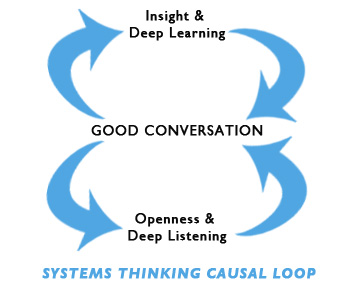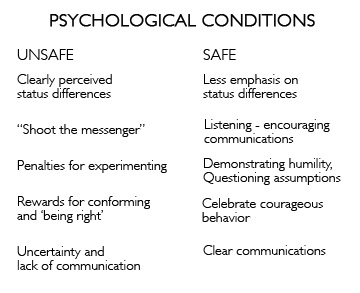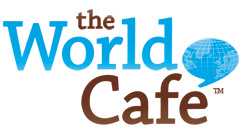Amplifying our Impact: Strategies for Unleashing the Power of Relationship, the 17th annual Pegasus Systems Thinking in Action Conference begins to weave the field even before we arrive as we connect with old friends and look forward to the new ones we’ll meet there.
On Monday morning, conference weavers Tom Hurley and Sharon Eakes opened by inviting us to “listen with all our parts” for the next few days, creating a living network of conversation with the possibility of rippling out beyond this event.

Before introducing Harvard professor Debra Meyerson, who was speaking on ‘Tempered Radicals’ for our first keynote, Tom told us that the word radical derived from the word “root” and gave us a few questions to ponder as we listen into her words …
“What are the “roots” in our lives that support our work?” and “What is it that is radiating from that root?
“How have we been “tempered” by our experiences in promoting change?” and “How have our failures, and well as our successes, strengthened us?”
Debra began by contrasting two models of change – the ‘episodic’ model that focuses on structured programs and top-driven big changes, and the more organic, ‘adaptive’ model with many small acts of incremental change.
In a world where what we see depends on our underlying perceptions, where the adaptive model is often seen to have less value than the episodic, we may miss the opportunities it offers.
For tempered radicals working within the system there is often a creative tension between the deviant impulse and the need to conform, the desire to effect change and at the same time maintain legitimacy.
Debra Meyerson outlined some creative ways to work with this tension and employ the adaptive model in everyday acts that become the building blocks of change. Small acts of self-expression – in our dress, language, and practices – that deviate from taken-for-granted notions of “normal” can be effective signals to inspire and encourage others to express themselves as well. Other micro moves that push against the status quo include taking “negotiated turns” by stepping up to problems and using them as opportunities to engage, have conversations and build allies, from there organizing coalitions of alliances based on shared interests.
Look for those ‘small wins’ Meyerson encourages, those doable opportunities for concrete action that can create confidence, alleviate anxiety, and attract allies and resources.
In addressing amplification from the local to the systemic, Meyerson says:
- Start with what works; refine and test the results of your small acts until they are concrete and proven
- Build meaning around your wins
- Use the results of your small wins as an excuse for starting conversations
- Frame the change in terms of the existing needs and interests of the organization
- Bundle a series of small winds together and call it a ‘program’, ‘pilot’, or initiative
- Find and create alliances with people who bridge networks and export your win
Given the status quo within many working environments where one is afraid to admit mistakes or take risks for fear of appearing incompetent, afraid to ask questions for fear of appearing ignorant, and afraid to deviate from the party line for fear of the repercussions of being seen as a non-conformist, none of these small acts can occur unless and until an environment of ‘psychological safety’ has been established. There needs to be a transformation from a culture of fear to culture of trust and openness.
In closing, she described a series of psychological conditions under which one might feel safe or unsafe, including acceptance of errors and genuine inquiry into symbols of deviance.
(Chris Corrigan, Gabriel Shirley and Teresa Posakony experimented with group blogging this keynote, passing Chris’ laptop between them to mark their impressions of Debra’s talk. Their harvesting artistry is posted on Chris’ blog, “Parking Lot’).
***
This year there was a new aspect to the conference – a conversation space that remained open throughout the conference as a reflective place to go and ‘be’ with the questions arising and share your experience with others. It was to be hosted during the morning concurrent sessions and afternoon forums, and open for self-organized conversation the rest of the time. So as the movement into the morning’s concurrent sessions began, this conversation space too was about to be inaugurated.
For the next chronological installment of this harvesting, about what happened in the conversation space, click here.



I thoroughly enjoyed this session. Thanks for writing this great summary! I wrote down my impressions at my blog: http://bombasto.wordpress.com/2007/11/07/pegasus-its-about-radicals/